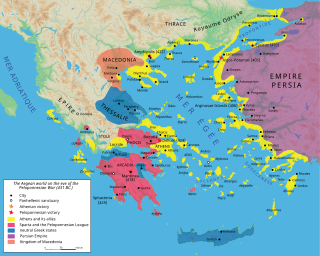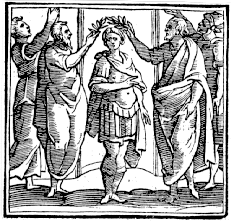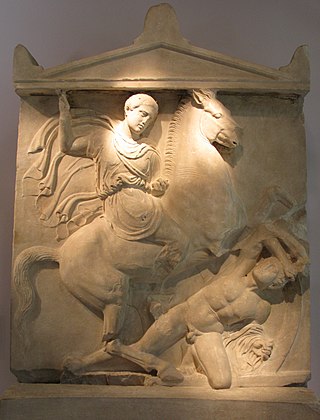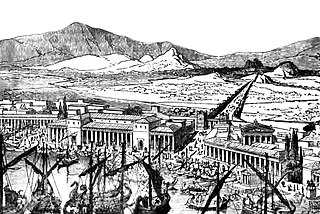
The Delian League was a confederacy of Greek city-states, numbering between 150 and 330, founded in 478 BC under the leadership (hegemony) of Athens, whose purpose was to continue fighting the Persian Empire after the Greek victory in the Battle of Plataea at the end of the Second Persian invasion of Greece. The League functioned as a dual –offensive and defensive– alliance (symmachia) of autonomous states, similar to its rival association, the Peloponnesian League. The League's modern name derives from its official meeting place, the island of Delos, where congresses were held within the sanctuary of the Temple of Apollo; contemporary authors referred to the organization simply as "the Athenians and their Allies".

The Battle of Marathon took place in 490 BC during the first Persian invasion of Greece. It was fought between the citizens of Athens, aided by Plataea, and a Persian force commanded by Datis and Artaphernes. The battle was the culmination of the first attempt by Persia under King Darius I, to subjugate Greece. The Greek army inflicted a crushing defeat on the more numerous Persians, marking a turning point in the Greco-Persian Wars.

The Second Peloponnesian War, often called simply the Peloponnesian War, was an ancient Greek war fought between Athens and Sparta and their respective allies for the hegemony of the Greek world. The war remained undecided until the later intervention of the Persian Empire in support of Sparta. Led by Lysander, the Spartan fleet finally defeated Athens which began a period of Spartan hegemony over Greece.

The 5th century BC started the first day of 500 BC and ended the last day of 401 BC.

Thrasybulus was an Athenian general and democratic leader. In 411 BC, in the wake of an oligarchic coup at Athens, the pro-democracy sailors at Samos elected him as a general, making him a primary leader of the ultimately successful democratic resistance to the coup. As general, he was responsible for recalling the controversial nobleman Alcibiades from exile, and the two worked together extensively over the next several years. In 411 and 410, Thrasybulus was in command along with Alcibiades and others at several critical Athenian naval victories.

The Greco-Persian Wars were a series of conflicts between the Achaemenid Empire and Greek city-states that started in 499 BC and lasted until 449 BC. The collision between the fractious political world of the Greeks and the enormous empire of the Persians began when Cyrus the Great conquered the Greek-inhabited region of Ionia in 547 BC. Struggling to control the independent-minded cities of Ionia, the Persians appointed tyrants to rule each of them. This would prove to be the source of much trouble for the Greeks and Persians alike.

Eretria is a town in Euboea, Greece, facing the coast of Attica across the narrow South Euboean Gulf. It was an important Greek polis in the 6th and 5th century BC, mentioned by many famous writers and actively involved in significant historical events.
The Battle of Cyzicus took place in May or June 410 BC during the Peloponnesian War. During the battle, an Athenian fleet commanded by Alcibiades, Thrasybulus, and Theramenes routed and destroyed a Spartan fleet commanded by Mindarus. The victory allowed Athens to recover control over a number of cities in the Hellespont over the next year. In the wake of their defeat, the Spartans made a peace offer, which the Athenians rejected.

Chabrias was an Athenian general active in the first half of the 4th century BC. During his career he was involved in several battles, both on land and sea. The orator Demosthenes described him as one of the most successful commanders Athens ever had:
To sum up the whole: he is the only general who never lost a single city or post or ship or soldier, when he commanded you: none of your enemies has any trophy over you and him, while you have many over many enemies under his command.
The Battle of Notium in 406 BC was a Spartan naval victory in the Peloponnesian War. Prior to the battle, the Athenian commander, Alcibiades, left his helmsman, Antiochus, in command of the Athenian fleet, which was blockading the Spartan fleet in Ephesus. In violation of his orders, Antiochus attempted to draw the Spartans into battle by tempting them with a small decoy force. His strategy backfired, and the Spartans under Lysander scored a small but symbolically significant victory over the Athenian fleet. This victory resulted in the downfall of Alcibiades, and established Lysander as a commander who could defeat the Athenians at sea.

The Corinthian War was a conflict in ancient Greece which pitted Sparta against a coalition of city-states comprising Thebes, Athens, Corinth and Argos, backed by the Achaemenid Empire. The war was caused by dissatisfaction with Spartan imperialism in the aftermath of the Peloponnesian War, both from Athens, the defeated side in that conflict, and from Sparta's former allies, Corinth and Thebes, who had not been properly rewarded. Taking advantage of the fact that the Spartan king Agesilaus II was away campaigning in Asia against the Achaemenid Empire, Thebes, Athens, Corinth and Argos forged an alliance in 395 BC with the goal of ending Spartan hegemony over Greece; the allies' war council was located in Corinth, which gave its name to the war. By the end of the conflict, the allies had failed to end Spartan hegemony over Greece, although Sparta was weakened by the war.

Hellenica simply means writings on Greek (Hellenic) subjects. Several histories of 4th-century Greece, written in the mould of Thucydides or straying from it, have borne the conventional Latin title Hellenica. The surviving Hellenica is an important work of the Ancient Greek writer Xenophon and one of the principal sources for the last seven years of the Peloponnesian War not covered by Thucydides, as well as the war's aftermath.

Although long walls were built at several locations in ancient Greece, notably Corinth and Megara, the term Long Walls generally refers to the walls that connected Athens' main city to its ports at Piraeus and Phaleron.

The Battle of Nemea of 394 BC, also known in ancient Athens as the Battle of Corinth, was a battle in the Corinthian War, between Sparta and the coalition of Argos, Athens, Corinth, and Thebes. The battle was fought in Corinthian territory, at the dry bed of the Nemea River. The battle was a decisive Spartan victory, which, coupled with the Battle of Coronea later in the same year, gave Sparta the advantage in the early fighting on the Greek mainland.

The Second Athenian League was a maritime confederation of Greek city-states that existed from 378 to 355 BC under the leadership (hegemony) of Athens. The alliance represented a partial revival of the Delian League, which had been disbanded in 404 BC following the defeat of Athens in the Peloponnesian War. The new League was centered in the Aegean and included over 60 states, among which were Kos, Mytilene, Rhodes, and Byzantium. It was primarily formed as a defensive alliance against Sparta and secondly the Persian Empire. The new League's main objective was to preserve peace in Greece and counterbalance Sparta's growing hegemony and aggression. The League largely revived Athenian influence in the Greek world, reestablishing it as the strongest naval power in the eastern Mediterranean. This time, Athens made conscious efforts to avoid the strict terms that had eventually rendered the previous Delian League unpopular. The alliance lasted until 355 BC, when most of the allied cities became independent following the Social War that broke out in 357 BC.

The siege of Eretria took place in 490 BC, during the first Persian invasion of Greece. The city of Eretria, on Euboea, was besieged by a strong Persian force under the command of Datis and Artaphernes.

Classical Greece was a period of around 200 years in Ancient Greece, marked by much of the eastern Aegean and northern regions of Greek culture gaining increased autonomy from the Persian Empire; the peak flourishing of democratic Athens; the First and Second Peloponnesian Wars; the Spartan and then Theban hegemonies; and the expansion of Macedonia under Philip II. Much of the early defining mathematics, science, artistic thought, theatre, literature, philosophy, and politics of Western civilization derives from this period of Greek history, which had a powerful influence on the later Roman Empire. Part of the broader era of classical antiquity, the classical Greek era ended after Philip II's unification of most of the Greek world against the common enemy of the Persian Empire, which was conquered within 13 years during the wars of Alexander the Great, Philip's son.
Eteonicus was a Spartan commander during the Peloponesian and Corinthian Wars. He participated in many key engagements, held important commands and is mentioned multiple times by Thucydides, Xenophon and Diodorus Siculus. His appearance in the record, however, is mostly episodic, with his roles not being particularly influential.
Hegesandridas or Agesandridas, son of a "Hegesander" or "Agesander", who could have been a member of the last Spartan embassy sent to Athens before the Peloponnesian War. Hegesandridas was a Spartan general in the Peloponnesian War. In 411 BC he was placed in command of a fleet of 42 ships instructed to further a revolt in Euboea. News of their being seen off Las of Laconia arrived in Athens at the time when the Four Hundred were building their fort of Eëtioneia on a promontory commanding Piraeus, and the coincidence was used by Theramenes as evidence of their treasonable intentions. Further intelligence that the same fleet had sailed over from Megara to Salamis coincided again with the riot in Piraeus, and was held to be certain proof of Theramenes' allegations.

The first Persian invasion of Greece, during the Greco-Persian Wars, began in 492 BC, and ended with the decisive Athenian victory at the Battle of Marathon in 490 BC. The invasion, consisting of two distinct campaigns, was ordered by the Persian king Darius the Great primarily in order to punish the city-states of Athens and Eretria. These cities had supported the cities of Ionia during their revolt against Persian rule, thus incurring the wrath of Darius. Darius also saw the opportunity to extend his empire into Europe, and to secure its western frontier.













